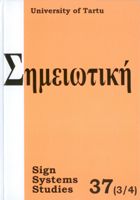Konrad Lorenz’s epistemological criticism towards Jakob von Uexküll
Konrad Lorenz’s epistemological criticism towards Jakob von Uexküll
Author(s): Carlo BrentariSubject(s): Semiotics / Semiology
Published by: Tartu Ülikooli Kirjastus
Summary/Abstract: In the work of Lorenz we find an initial phase of great concordance with Uexkulls theory of animals’ surrounding-world (Umweltlehre), followed by a progressive distance and by the occurrence of more and more critical statements. The moment of greater cohesion between Lorenz and Uexkull is represented by the work Der Kumpan, which is focused on the concept of companion, functional circles, social Umwelt. The great change in Lorenz’ evaluation of Uexkull is marked by the conference of 1948 Referat über Jakob von Uexküll, where Lorenz highlights the vitalist position of Uexkull. In the works of the years after World War II, the influence of the Estonian Biologist greatly diminishes, even though Lorenz continues to express his admiration for particular studies and concepts of Uexkull. References to Uexkull’s work are less and far in between, while the difference is highlighted between the uexkullian theoretical frame (vitalistic) and Lorenz’s one (Darwinian and evolutionist). The two main critical lines of argument developed by Lorenz in this process are the biological and the epistemological one: on the biological side Lorenz heavily criticizes Uexkull’s vitalism and his faith in harmonizing forces and supernatural factors (which leads to concepts such as the perfect fusion of all biological species in their environment and the absence of rudimentary organs). On the epistemological side, Lorenz, arguing from the point of view of the critical realism, accuses Uexkull of postulating the separateness of all living beings, a separateness which is due to the Kantian idea that every subject of knowledge and action is imprisoned in the transcendental circle of its representations and attitudes.
Journal: Σημειωτκή - Sign Systems Studies
- Issue Year: 37/2009
- Issue No: 3-4
- Page Range: 637-662
- Page Count: 26
- Language: English

